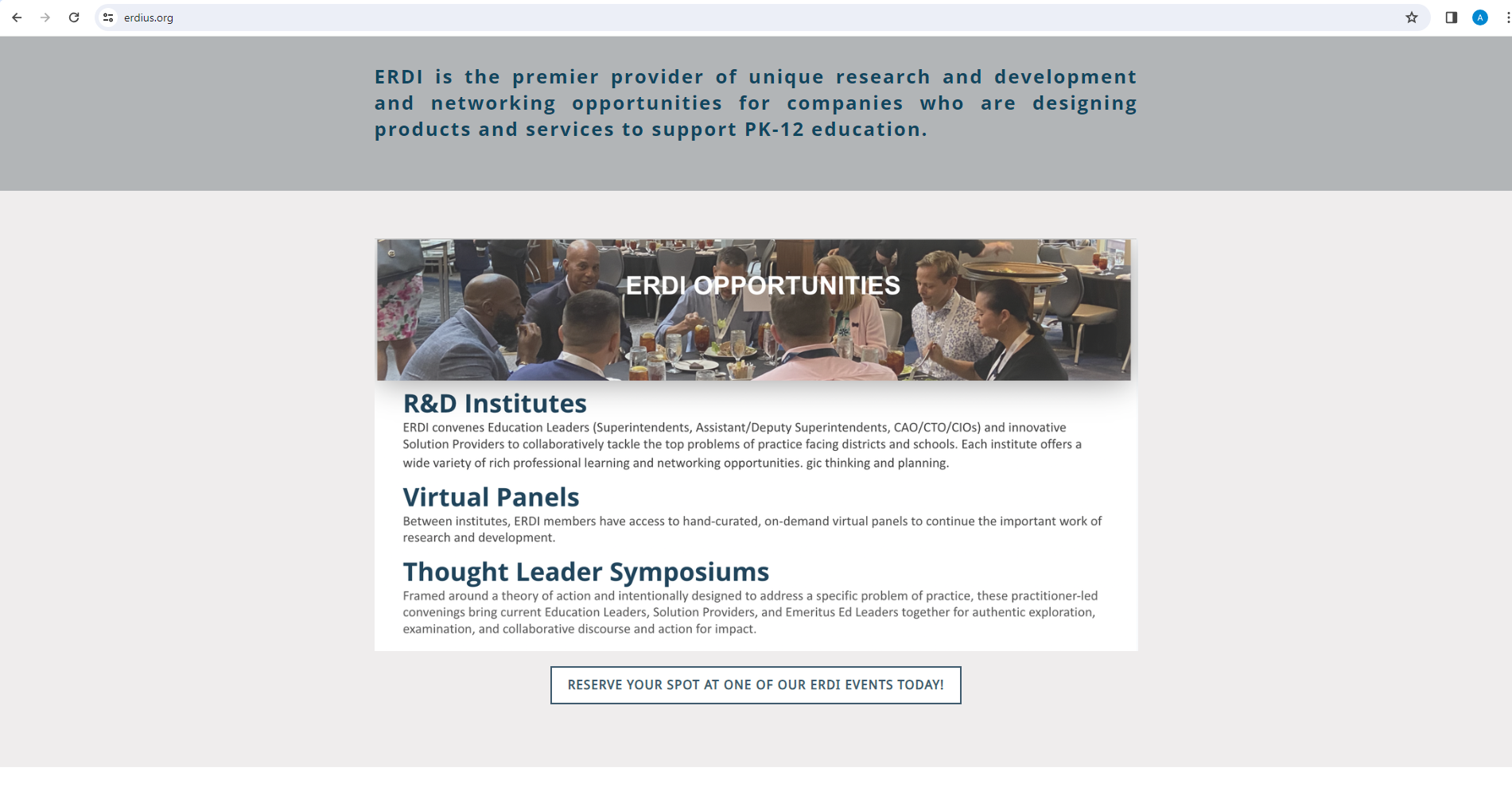By Adam Pagnucco.
In 2019, new MCPS Interim Superintendent Monique Felder was investigated by Nashville’s local government over payments made to her by an outside group when she was a senior administrator of their school district. The investigation found that she initially did not disclose the payments but she later filed an addendum including them. While there was a dust-up over the disclosure issue – which Felder fixed – the bigger issue is the money itself.
In 2016 and 2017, Felder accepted a total of $6,000 in “honorariums” plus travel expenses from Education Research and Development Institute (ERDI) while she was the chief academic officer at Metropolitan Nashville Public Schools. ERDI says that it “convenes Education Leaders (Superintendents, Assistant/Deputy Superintendents, CAO/CTO/CIOs) and innovative Solution Providers to collaboratively tackle the top problems of practice facing districts and schools.” Its forum for doing so is its “institutes,” which are held at various places around the country each year. ERDI solicits memberships by stating, “Members gain access to the rich, 40 year old ERDI community of top Education Leaders and Solution Providers who are working collectively to improve education. Connect with the ERDI community at the Institutes – and throughout the year.”

ERDI’s pitch on its website.
In 2017, the New York Times obtained ERDI’s 2017 fee schedule for its conferences in an article titled “How Much it Costs to Meet With Superintendents.” The fees, which range up to tens of thousands of dollars, are reprinted below.


Reporting on ERDI’s activities goes back at least as far as a 2005 article in Education Week, which stated:
This past summer, nearly 100 superintendents from around the country received $2,000 each in consulting fees as well as a free trip to a conference at a luxury resort in Rancho Mirage, Calif., to advise companies how to improve the products and services they offer school systems. The three-day event was sponsored by the for-profit Education Research and Development Institute, based in Grand Island, Neb., and underwritten by companies that want to work with schools.
That’s similar to Felder’s experience in Nashville. In 2019, News Channel 5 reported that Discovery Education, a company seeking to do business with the district, met with Felder’s boss, Metro Schools Director Shawn Joseph, in 2016. And then:
Ten days later, records show Joseph’s chief academic officer, Dr. Monique Felder, got paid $2,000 dollars by the vendor group, Educational Research Development Institute, to meet with companies that want to do business with school systems and offer her advice.
Emails show that after a dinner cruise around Chicago for conference participants, Discovery Education invited her to a rooftop bar for a “networking reception.”
Then, in early November 2016, Discovery was back in the director’s office, ready to make a formal presentation of what they were ready to do for Metro Schools.
According to News Channel 5, Discovery was later awarded “an $11.4 million contract with no real competition.” That prompted one Nashville school board member to protest conflicts of interest involving ERDI, charging, “ERDI’s sole purpose is to act as a middleman between school districts and ed vendors.”
It’s not just Nashville. ERDI’s activities have spawned media coverage and government investigations around the nation.
Pittsburgh, PA
A 2019 investigation by Pittsburgh TV station KDKA found that Superintendent Anthony Hamlet was paid by ERDI and then awarded “more than $14 million on dozens of no-bid Edtech contracts” to “several of ERDI’s clients.” The city controller said, “He’s getting paid by people he’s awarding contracts to. That’s an absolute blatant conflict of interest.” The Pennsylvania State Ethics Commission later found numerous violations by Hamlet and he resigned in 2021.
Kent, WA
According to a 2018 article by KNKX Public Radio, Kent Superintendent Calvin Watts admitted to taking a $2,250 honorarium from ERDI, prompting complaints from parents and a formal inquiry by the school board. After the Kent teachers union complained of “fiscal mismanagement” by Watts and demanded his resignation, Watts eventually left for a different job in Georgia.
Beaufort County, SC
In 2019, former Beaufort County School District Superintendent Jeffrey Moss entered into a consent degree with the South Carolina State Ethics Commission related to payments he had received from ERDI. According to the South Carolina Department of Education, Moss “admitted to violating the South Carolina Ethics, Government Accountability, and Campaign Finance Act (Ethics Act) by using his public employment to obtain an economic interest.” He was required to pay more than $7,000 to the school district and ethics commission over his receipt of $17,100 from ERDI. The issue prompted multiple subpoenas by the U.S. Attorney’s Office and an FBI investigation, resulting in his resignation.
Youngstown, OH
In 2017, the Vindicator in Youngstown, Ohio reported: “The Youngstown City School District contracted with a company that is a partner of a firm for which CEO Krish Mohip was a paid consultant. The school district has paid $261,914 to Curriculum Associates, a partner company of Education Research & Development Institute, which used Mohip as recently as August as a paid consultant.” Mohip “acknowledged he was paid $4,000 in 2017 by ERDI for his position on two educational review panels” and quit his paid relationship with ERDI after being questioned about it. Mohip resigned from the school district two years later.
Baltimore County, MD
In 2018, Baltimore County Superintendent Dallas Dance was indicted on four counts of perjury for “failing to disclose nearly $147,000 in pay he received for private consulting with several companies and school districts beginning in 2012,” according to the Baltimore Sun. The payments included some from “the Educational Research and Development Institute, a company that represents educational technology firms seeking to get contracts from school districts including Baltimore County.”
Dance later pleaded guilty and was sentenced to prison. The New York Times reported the following on his relationship with ERDI:
In court documents, the state said Mr. Dance had concealed about $12,000 in payments he received through his consulting work in 2015, including $4,600 from the Education Research and Development Institute — ERDI for short — an organization that pays superintendents to attend meetings with educational tech companies.
ERDI has charged companies $13,000 to organize a meeting with five superintendents or other school leaders to discuss products, according to documents obtained by The Times. After Mr. Dance participated in confidential meetings with two of his district’s tech vendors at an ERDI conference last year, the district extended both companies’ contracts.
As for MCPS, it has already apparently encountered ERDI. Yolanda Stanislaus, MCPS’s Director of Professional Growth Systems, has given a glowing review of the group on its website. That raises the question of whether any MCPS administrators have taken money from ERDI.
So let’s be fair. MCPS Interim Superintendent Monique Felder is far from the only school administrator who has accepted honorariums from ERDI. Apparently, it’s a common practice by school officials all around the country, and it has landed several of them in hot water.
Felder is now in a position to do some good on this issue. Specifically, she should ban MCPS from participating in any arrangements of this kind. If she does that, she would show that she is truly interested in building trust with our community.
And what do the school board candidates think about this issue? I asked them about it in our questionnaire. We will find out what they have to say about it tomorrow.
